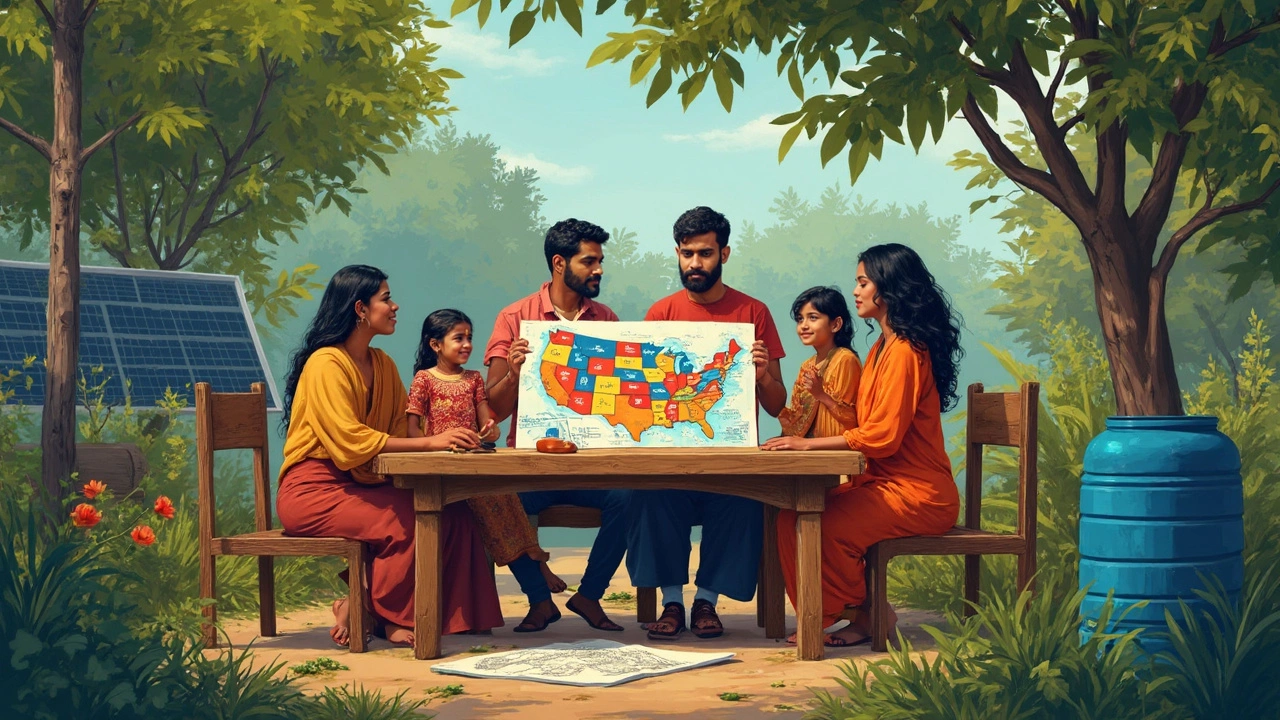Thinking that living off the grid is as simple as buying some land and setting up a tiny house? Not quite. Rules on going off-grid change wildly from state to state. Some places welcome the idea; others, not so much. I learned this the hard way when a friend in Florida got fined for building a cabin with no connection to the city water supply.
You’d think that in America, you could just unplug and do your own thing. But nope. Some states—even whole counties—make it tough. There are codes about what kinds of septic systems you need, rules about solar panels and compost toilets, and some places even outlaw rainwater collection. That’s right, gathering rain for your tomatoes can get you in hot water, depending on where you settle down.
If you’re serious about breaking free from utility bills, you need to know where living off the grid is a legal headache. I’ve pulled together the states where the law says “no” or piles on the red tape. This way, you won’t end up dealing with angry county inspectors instead of cozy campfires.
- What Does 'Off the Grid' Really Mean?
- States With Strict Off-Grid Living Laws
- Surprising Laws That Can Stop Your Dream
- Smarter Ways to Buy Land for Off-Grid Life
What Does 'Off the Grid' Really Mean?
People throw around the phrase "off the grid" a lot, but what does it actually mean? At its core, it means living without relying on public utilities—no city electricity, no municipal water, and no connection to public sewer lines. Most folks who talk about going off-grid are really aiming for self-sufficiency. That means generating their own power, digging their own wells or collecting rainwater, and handling waste without a city sewer system.
But it isn’t just about cutting the cord from the electric company. Some folks take it further and become as self-reliant as possible, growing their own food, raising animals, and depending on nothing but their own land and skills.
Here’s a quick breakdown of typical things off-grid living covers:
- Electricity: Off-gridders often use solar panels, wind turbines, or generators instead of public power lines.
- Water: Some drill wells, dig ponds, or (where legal) collect rainwater for drinking and washing.
- Waste: Septic tanks, composting toilets, and even outhouses replace public sewers.
- Food: Many grow gardens or raise chickens for a steady food supply.
Here’s a look at how many Americans are interested in or already living this way. According to the National Renewable Energy Laboratory (NREL), the interest in energy self-reliance is growing every year.
| Aspect | Typical Off-Grid Solution | Basic Legal Requirement (varies by state) |
|---|---|---|
| Electricity | Solar panels, wind | Permits for installation; some states require backup grid connection |
| Water | Well, rainwater, cistern | Drilling permits; rainwater sometimes restricted |
| Sewage | Septic system, composting toilet | County-approved systems required |
| Food | Gardening, livestock | Limits in some areas, especially on animals |
Here’s the catch: while being off-grid sounds like true freedom, each state—and often each local county—has its own rules on what’s allowed. You can’t assume your dream property will let you live without any connections. That’s why doing your homework is the most important step for anyone thinking about off grid life.
States With Strict Off-Grid Living Laws
If you’re dreaming about going off the grid, you absolutely need to know which states make things tricky—or downright illegal. That "live free" idea clashes pretty hard with local government in some states, especially on the East Coast and Midwest. Tough building codes, utility hookup mandates, and water rights laws are the main things that trip people up.
Let’s break down which states have the most red tape and what you should watch out for:
- Florida: In some towns (like Cape Coral), city codes require homes to connect to public utilities. Remember the Robin Speronis case? She got in big trouble for living in a house with solar panels and no city water. Off-grid living can get you fined or even kicked out if you go against local rules.
- Texas: You’d think Texas would be a go-anywhere, do-anything state, but some counties have strict septic and building codes. In certain areas, you must have a septic system approved by the state, and compost toilets might not be accepted.
- New Jersey: This state is known for the strictest code enforcement in the country. Most municipalities require all homes to hook up to the grid, so off-grid folks rarely last long here.
- Colorado: In parts of Colorado, collecting rainwater was illegal until a few years ago, and many counties still force you to connect to public utilities, especially close to Denver. In other spots, you’ll need permits just to install solar panels or dig a well.
- California: Probably the most complicated. California’s building codes are deep, and you’ll run into trouble trying to build a small cabin without permitted water, sewage, and power. Some rural counties are easier, but most of California expects you to connect to the grid.
Here's a quick look at some known restrictions, so you have the facts in one spot:
| State | Common Off-Grid Barriers | Recent Stats or Cases |
|---|---|---|
| Florida | Mandatory utility hookups, code enforcement | Robin Speronis case (2014): evicted for off-grid home |
| New Jersey | Building code strictness, grid hookup required | Statewide uniform construction code, rare exceptions |
| California | Permits, septic/water/power mandates | Countless code violation cases in Los Angeles county |
| Texas | Septic approval, water rights issues | 2015: Dallas County prosecuted multiple "illegal dwellings" |
| Colorado | Utility mandates in metro counties, rainwater limits | Rainwater collection legalized in 2016, with permits |
So if you’re set on off grid living, double-check those county and city codes—not just state laws. Each area’s rules can be wildly different and change fast. Worst case, you might love the scenery but wind up stuck paying for utility hookups you don’t even want.

Surprising Laws That Can Stop Your Dream
You’d think buying land and living your own way would be simple. Turns out, all kinds of laws can make off grid living a serious hassle. Stuff you never even thought about can get you in trouble fast.
Here's a look at weird and frustrating laws from across the U.S. that have caused headaches for plenty of would-be homesteaders:
- Rainwater Collection Bans: Colorado used to have a total ban—now you can collect, but only up to 110 gallons. Try collecting more and you could face a fine. Utah and Nevada also have limits or require permits.
- Minimum Square Footage Laws: In Georgia, at least 150 square feet per home. Some counties in New York and Texas enforce even higher minimums. Tiny homes on wheels? Many towns say those count as RVs, which usually can’t be lived in full-time.
- Mandatory Utility Hookups: Florida and parts of California have strict rules: buy rural land, build a house, then you’re forced to connect to water and/or sewer (even if you don’t want to). A woman outside Orlando once made headlines for being told she couldn’t live on her own solar and composting toilet—even after years without issues.
- Septic System Requirements: Many states won’t let you use composting toilets unless you also install a pricey septic system. New Jersey and Massachusetts are especially unfriendly toward alternative setups.
- Zoning Restrictions: Certain counties in Arkansas and Tennessee have zoning rules that block you from even parking a trailer unless you build a home up to code. Some require multiple inspections a year just to make sure you’re using energy “safely.”
If you want to see just how much things can change by ZIP code, check out this table:
| State | Rainwater Collection Allowed? | Minimum House Size | Mandatory Utilities? |
|---|---|---|---|
| Colorado | Yes (with limit) | Varies (county rules) | Rarely, but some places do |
| Florida | Yes | 120-150 sq ft | Often required |
| Texas | Yes | 150 sq ft or more | Some counties require hookups |
| New York | Yes | 200 sq ft or more | Usually required |
| New Jersey | Yes | Varies | Strict septic rules |
So before you get too far, always double-check the laws in your target town or county. Even rural spots can have surprise requirements. If you want to keep things simple, seek out counties with little to no zoning—these pockets still exist, but you’ve got to hunt for them. Always get things in writing from local officials, and talk to neighbors who already live off-grid to make sure you aren’t stepping into a legal mess.
Smarter Ways to Buy Land for Off-Grid Life
So, you want to skip the drama and actually live off the grid without breaking state or county laws? The trick isn’t just finding cheap land—it’s finding the right land. Here’s how I’d go about it if I was buying all over again (and honestly, learning from friends’ mistakes has saved me loads of time and money).
First, check the local zoning rules and building codes. Some areas have “no zoning,” while others require full utility hookups for any new house, even a shed. Call the county planning office yourself. Never trust a real estate ad alone—some sellers haven’t read the fine print either.
- Look for unincorporated areas. These often have the fewest rules and lower taxes. That’s where a lot of off-gridders end up for good reason.
- Think about water. If it’s illegal to have a well or to harvest rainwater, you’re going to have a bad time. States like Texas and Alaska are relaxed about this, but folks in Colorado or Nevada can run into headaches.
- Access matters. Ask if your land is “landlocked.” You don’t want to buy a parcel and then discover you have no legal way to reach it except hiking through someone else’s backyard.
- Check if your land is in a floodplain or a wildfire zone. Government data is free online, and insurance in these spots is either sky-high or won’t exist at all.
Big tip: Look at the local requirements for septic systems. In some counties, you can’t go off-grid with a composting toilet at all—only allowed with a certified septic system, which can easily cost $10,000 or more.
Here’s a quick look at which states are friendliest—and toughest—about off grid living requirements:
| State | Off-Grid Friendliness | Key Obstacles |
|---|---|---|
| Texas | High | Minimal building codes, lots of rural land |
| California | Low | Strict building codes, water rights, wildfire risk |
| Colorado | Medium | Rainwater collection rules, some zoning |
| Florida | Low | Building code enforcement, mandatory hook-ups in many counties |
| Alaska | High | Remote locations, extreme weather more than legal problems |
One smart play is to join online forums or networks of current off-gridders in the state you’re looking at. Real people will give you real answers about what worked for them and what got them a nasty letter from the county. If you find a seller open to owner financing, you also dodge some bank red tape that comes with unconventional homes.
The bottom line: Don’t skip homework on local laws, utilities, and hidden costs. People who do end up with expensive surprises or back in the city before they’ve even grown their first tomato.

